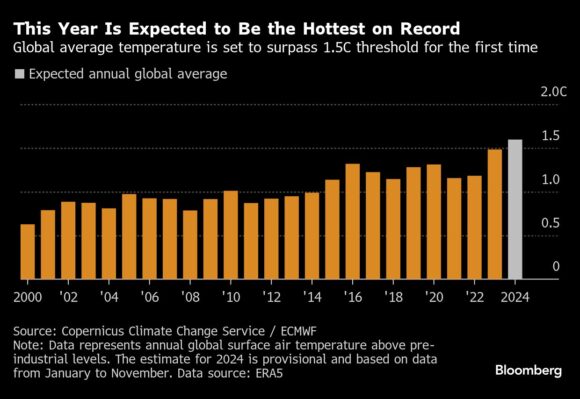This year is “effectively certain” to be the warmest on record with temperatures climbing above a closely watched threshold for the first time.
The average global temperature reached 1.62C above pre-industrial levels in November, according to the EU-funded Copernicus Climate Change Service, surpassing the symbolic 1.5C level, a threshold that’s become significant because of its inclusion in the Paris Agreement. Last month wasthe second-hottest November on record, behind the same period last year, according to the group.
The findings add urgency to calls to reduce carbon emissions. While the 1.5C target is based on longer periods than one year, recent trends are making it appear increasingly out of reach.
“We can now confirm with virtual certainty that 2024 will be the warmest year on record and the first calendar year above 1.5C,” Samantha Burgess, deputy director of the Copernicus Climate Change Service, said in a statement. “This does not mean that the Paris Agreement has been breached, but it does mean ambitious climate action is more urgent than ever.”

Current pledges and policies are insufficient to limit warming to 1.5 or even 2C above the pre-industrial average, according to the UN. Current commitments put the world on course for temperatures of 2.6 to 2.8C and even these are not being met, it said in a report published shortly before the COP29 climate conference last month. A political backlash against climate policy, particularly in Europe and the US, is also increasing uncertainty that targets can be met.
Of the past 17 months, 16 have been more than 1.5C hotter than the pre-industrial average, according to the Copernicus Climate Change Service report. The data, which has been published ahead of the end of the year, will be followed by official full-year data in January.
Top photo: A pedestrian carries a newly purchased electric fan in the Attaba district of Cairo, Egypt in June 2024. Photo credit: Islam Safwat/Bloomberg
Related:
- Insured Losses From Natural Disasters Top US$100B for 5th Consecutive Year: Swiss Re
- EU Seeks to Streamline ESG Regulations Amid Growing Backlash
Was this article valuable?
Here are more articles you may enjoy.


 Hackers Hit Sensitive Targets in 37 Nations in Spying Plot
Hackers Hit Sensitive Targets in 37 Nations in Spying Plot  Canceled FEMA Review Council Vote Leaves Flood Insurance Reforms in Limbo
Canceled FEMA Review Council Vote Leaves Flood Insurance Reforms in Limbo  Tesla Sued Over Crash That Trapped, Killed Massachusetts Driver
Tesla Sued Over Crash That Trapped, Killed Massachusetts Driver  These Five Technologies Increase The Risk of Cyber Claims
These Five Technologies Increase The Risk of Cyber Claims 